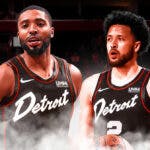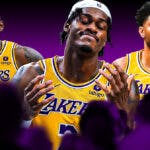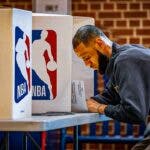Endless debates are waged over the best backcourts in the NBA, perhaps because it's a simple argument to make. A basketball novice could add up the points and assists of each team's starting guards, and deem the team with the most total points the best. Of course, it's not that simple, but it is more straight-forward than arguing the best frontcourt in the NBA. Frontcourt players are asked to do more, particularly on the defensive end, and their value is more difficult to quantify. In the modern NBA, with positions being blurred, power forwards playing point guard and centers shooting threes, it's a complex question to ask. But let's ask it anyway: which team has the best frontcourt (small foward, power foward, center and reserves) in the league?
Honorable mention: LA Clippers
If Kawhi Leonard were healthy coming into the season, the Clippers would no doubt be among the top five frontcourts. Leonard and Paul George alone make their case (though George technically assumed the role of a 6'9 shooting guard for much of the last two seasons), but their depth at positions 3-5 are matched by few in the league. Marcus Morris Sr., Ivica Zubac, Serge Ibaka, Nicolas Batum and Terance Mann are all above replacement-level players at their positions, and fit seemlessly next to ball-dominant wings like George and Leonard. They can go small and play a switching, five-out system, or match bigger teams with traditionally-sized centers. Who knows; in 2022-23, if Leonard returns to form, the Clippers might take the no. 1 slot on this list.
5. Brooklyn Nets
The Nets make this list if for no other reason than out of respect for Kevin Durant. Arguably the best player in the NBA, Durant can (and often has to) play all three frontcourt positions, spreading the floor for his team or operating out of the post. Beyond Durant, the Nets are a fascinating yet slightly thin group up front, particularly with Jeff Green departing for the Denver Nuggets (more on them later). Joe Harris remains one of the best shooters in the league, Bruce Brown is a unique power-guard that gives the Nets defensive versatility and Blake Griffin revived himself as a playmaking center, but they lack a true rim-protector beyond the lanky Durant. Young Nick Claxton could be the answer there, as he averaged 2.4 blocks per 36 minutes last season for Brooklyn.
4. Philadelphia 76ers
Similar to the Nets, the 76ers could've made this list off of Joel Embiid's talent alone. The argument was often made for Embiid as the per-minute MVP last season, but that is precisely why they aren't higher in the rankings. At this point, it's safe to pencil in Embiid to miss at least 15 games a season, and Philadelphia has been aimlessly searching for a decent backup center for years. Andre Drummond will give it a shot this year, though his performance in last year's postseason with the Los Angeles Lakers shouldn't give Head Coach Doc Rivers much confidence.
Beyond center, the Sixers have a sturdy, borderline All-Star at power forward in Tobias Harris, and acquired a solid backup for him in Georges Niang this offseason. On the wing, Danny Green will return on a two-year, $20 million deal, maintaining a crucial blend of defense and floor-spacing.
Ben Simmons remains on the roster amid trade rumors, but his primary position is still point guard. Perhaps Rivers will experiment with some lineups with Simmons at power forward or center, and unclock something in the 6'10 unicorn.
3. Denver Nuggets
Of course, the team with the reigning MVP on it has to make this list. Nikola Jokic has already cemented his legacy as the greatest passing center of all time, and the Nuggets' front office has done a great job of surrounding him with athletic wings to make up for his defensive deficiencies. The acquisition of Aaron Gordon at the trade deadline was a home run—the three-man lineup of Jokic, Gordon and Michael Porter Jr. outscored opponents by 10.7 points per 100 possessions last season. They also stole Jeff Green from the Nets, giving them a solid, switchable backup center for the precious moments when Jokic sits.
Porter is the key here. He averaged 17.4 points per game while shooting 39.7% from three in the postseason for the Nuggets in the absence of Jamal Murray. With Murray expected to miss much of the 2021-22 season with a torn ACL, Porter will need to maintain this level of play as a secondary offensive threat next to Jokic. If he can vault himself into All-Star form, the Nuggets could slide even higher up this list.
2. Milwaukee Bucks
They're the NBA champions for a reason. That reason is 90% Giannis Antetokounmpo, who does more for his team on both ends of the ball than arguably any other player in the league, but they've got quite a bit of talent outside of the Greek Freak as well.
Khris Middleton, like Paul George, is a tweener, blurring the line between shooting guard and small forward. However, at 6'8, he often guards bigger wings, and his ability to slide up to the small forward or power forward position when the Bucks go small with Antetokounmpo at center is what makes the Milwaukee's frontcourt so deadly. He proved he's a deadly isolation scorer in the Finals, particularly in the clutch, and this skillset is a perfect fit alongside a shakey shooter like Antetokounmpo.
The loss of PJ Tucker hurts, as he was often given the assignment of guarding the opponent's best permimeter threat. Even still, they have a floor-spacing, rim-protecting center in Brook Lopez and a wildcard who proved to be worth the gamble in Bobby Portis (they re-signed him on a two-year, $9 million deal this offseason). Who knows—perhaps Thanasis Antetokounmpo will pop next season and the Bucks will have the deadliest brother-combo in the league.
1. Los Angeles Lakers
If it were 2014, this wouldn't even be a question. The Lakers' frontcourt depth chart is a hilarious amalgamation of former All-Stars and notable names that came to LA to chase a ring and live in a great weather city. Carmelo Anthony and Dwight Howard are by no means the reason the Lakers are no. 1 on this list. In fact, they might even detract from LA's case. Trevor Ariza is fine albeit a bit long in the tooth, and Marc Gasol is going to be desperately needed as a floor-spacer with the addition of Russell Westbrook, but neither player really moves the needle.
The Lakers are no. 1 simply because they have two of the top five players in the league when healthy. LeBron James and Anthony Davis are quite possibly the best duo in the NBA, bringing an unmatched combination of size, defensive dominance (when James is engaged) and pick-and-roll versatility. Last season's flameout against the Phoenix Suns is a blemish, and perhaps Father Time will finally catch up to James this year. But until they are dethroned with no injury excuse, they deserve the benefit of the doubt.




